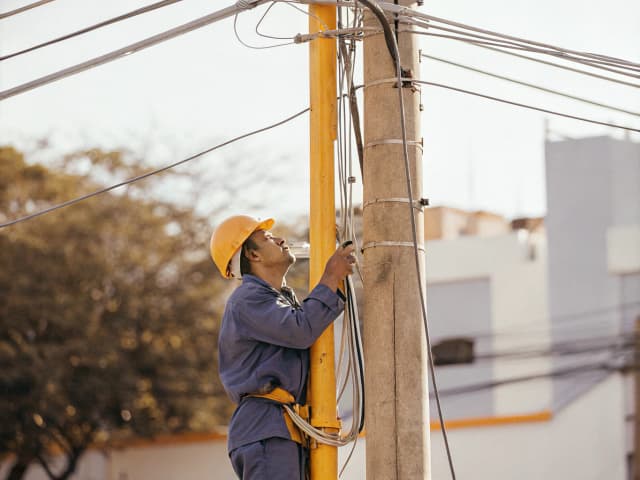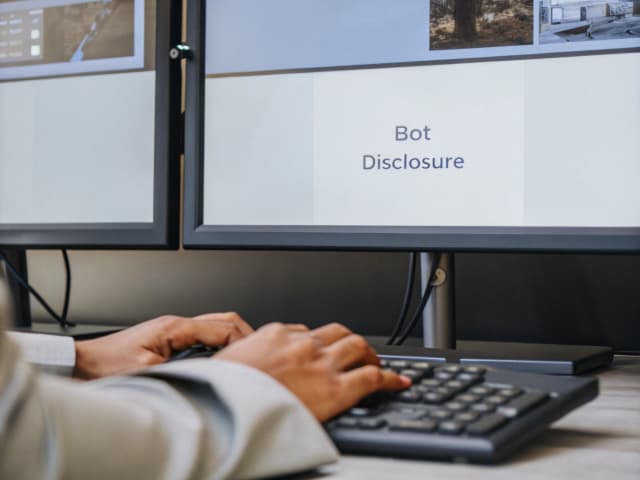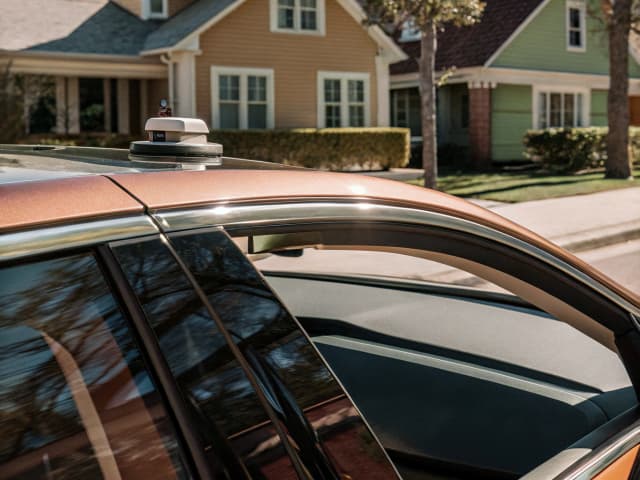Technology & Innovation

Artificial intelligence models: large developers.
Requires large frontier developers to publish a frontier AI framework with mitigations. Establishes CalCompute in the GOA, operable by appropriation; report due January 1, 2027. Imposes whistleblower protections with penalties up to one million dollars per violation.
Artificial intelligence models: large developers.

Requires large frontier developers to publish a frontier AI framework with mitigations. Establishes CalCompute in the GOA, operable by appropriation; report due January 1, 2027. Imposes whistleblower protections with penalties up to one million dollars per violation.

Artificial intelligence technology.
Establishes a warning regime for artificial intelligence digital replicas by December 1, 2026. Imposes up to $10,000 daily civil penalties on providers for noncompliance. Expands civil remedies to stop unauthorized digital replicas, with removal within two business days. Requires the judiciary to study artificial intelligence's impact on evidence and craft rules by 2027.
Artificial intelligence technology.

Establishes a warning regime for artificial intelligence digital replicas by December 1, 2026. Imposes up to $10,000 daily civil penalties on providers for noncompliance. Expands civil remedies to stop unauthorized digital replicas, with removal within two business days. Requires the judiciary to study artificial intelligence's impact on evidence and craft rules by 2027.

California AI Transparency Act.
Delays the act’s operative date and expands AI transparency to platforms and devices. Requires large online platforms to detect provenance data and disclose content origin by 2027. Requires GenAI hosting platforms to place disclosures in outputs by 2027. Requires capture device makers to embed latent disclosures by default by 2028.
California AI Transparency Act.

Delays the act’s operative date and expands AI transparency to platforms and devices. Requires large online platforms to detect provenance data and disclose content origin by 2027. Requires GenAI hosting platforms to place disclosures in outputs by 2027. Requires capture device makers to embed latent disclosures by default by 2028.

California Cybersecurity Integration Center: artificial intelligence.
Establishes a California AI cybersecurity collaboration playbook to unite cyber and AI defenses. Imposes mandatory information sharing with AI service providers and limits disclosures. Creates four annual expenditure reports on federal cybersecurity funding. Expands Cal-CSIC governance, adds a statewide strategy and a Cyber Incident Response Team.
California Cybersecurity Integration Center: artificial intelligence.

Establishes a California AI cybersecurity collaboration playbook to unite cyber and AI defenses. Imposes mandatory information sharing with AI service providers and limits disclosures. Creates four annual expenditure reports on federal cybersecurity funding. Expands Cal-CSIC governance, adds a statewide strategy and a Cyber Incident Response Team.

Leading Ethical AI Development (LEAD) for Kids Act.
Establishes the LEAD for Kids Act to regulate companion chatbots for California minors. Prohibits making a companion chatbot available to a child if it is foreseeably capable of harms. Authorizes civil penalties and private suits; penalties are $25,000 per violation. Prescribes child-status rules: knowledge before 2027; after, determine not-a-child.
Leading Ethical AI Development (LEAD) for Kids Act.

Establishes the LEAD for Kids Act to regulate companion chatbots for California minors. Prohibits making a companion chatbot available to a child if it is foreseeably capable of harms. Authorizes civil penalties and private suits; penalties are $25,000 per violation. Prescribes child-status rules: knowledge before 2027; after, determine not-a-child.

Companion chatbots.
Establishes a new chapter governing companion chatbots for safety and transparency. Requires clear AI notifications if misperception could occur and online protocol publication. Mandates minor protections including AI disclosure and reminders every three hours. Allows private suits with damages and injunctive relief, with reporting starting July 1, 2027.
Companion chatbots.

Establishes a new chapter governing companion chatbots for safety and transparency. Requires clear AI notifications if misperception could occur and online protocol publication. Mandates minor protections including AI disclosure and reminders every three hours. Allows private suits with damages and injunctive relief, with reporting starting July 1, 2027.

Artificial intelligence: defenses.
Establishes a new Civil Code rule barring an AI autonomous-causation defense. Applies to defendants who developed, modified, or used AI. Defines AI as a machine-based system with varying autonomy. Provides no explicit effective date or penalties; enforcement via courts.
Artificial intelligence: defenses.

Establishes a new Civil Code rule barring an AI autonomous-causation defense. Applies to defendants who developed, modified, or used AI. Defines AI as a machine-based system with varying autonomy. Provides no explicit effective date or penalties; enforcement via courts.

Autonomous vehicles.
Authorizes autonomous vehicles to use special marker lights starting January 2026 to indicate when self-driving is active. Requires manufacturers to maintain $5 million in insurance coverage for autonomous vehicle testing. Mandates autonomous vehicles store sensor data for 30 seconds before any collision and retain it for three years. Requires all autonomous vehicles under 8,501 pounds to be zero-emission starting with 2031 models.
Autonomous vehicles.

Authorizes autonomous vehicles to use special marker lights starting January 2026 to indicate when self-driving is active. Requires manufacturers to maintain $5 million in insurance coverage for autonomous vehicle testing. Mandates autonomous vehicles store sensor data for 30 seconds before any collision and retain it for three years. Requires all autonomous vehicles under 8,501 pounds to be zero-emission starting with 2031 models.

Telephone corporations: carriers of last resort.
Establishes a process for telephone companies to be relieved of last-resort service obligations in well-served areas. Requires companies to expand fiber optic networks to three times their current customer base within six years. Creates a new grant fund for public safety agency technology upgrades and emergency communications. Mandates companies provide discounted services and transition assistance to eligible customers for 24 months.
Telephone corporations: carriers of last resort.

Establishes a process for telephone companies to be relieved of last-resort service obligations in well-served areas. Requires companies to expand fiber optic networks to three times their current customer base within six years. Creates a new grant fund for public safety agency technology upgrades and emergency communications. Mandates companies provide discounted services and transition assistance to eligible customers for 24 months.

Lifeline program: broadband internet access service.
Establishes a voluntary program for internet providers to offer subsidized broadband service to low-income households. Requires participating providers to offer internet plans with 100Mbps download speeds for $30 or less monthly. Prohibits requiring customers to bundle internet with phone service to receive the subsidy. Mandates program evaluation by 2028 and automatically expires in 2032.
Lifeline program: broadband internet access service.

Establishes a voluntary program for internet providers to offer subsidized broadband service to low-income households. Requires participating providers to offer internet plans with 100Mbps download speeds for $30 or less monthly. Prohibits requiring customers to bundle internet with phone service to receive the subsidy. Mandates program evaluation by 2028 and automatically expires in 2032.

Communications: broadband internet service providers: affordable home internet service.
Requires California internet providers to offer $15 monthly high-speed internet plans to low-income households. Mandates minimum speeds of 50 Mbps download and 10 Mbps upload for affordable internet plans. Requires providers to promote affordable plans and submit annual reports starting January 2027. Exempts small providers with fewer than 50,000 subscribers and those participating in California Lifeline.
Communications: broadband internet service providers: affordable home internet service.

Requires California internet providers to offer $15 monthly high-speed internet plans to low-income households. Mandates minimum speeds of 50 Mbps download and 10 Mbps upload for affordable internet plans. Requires providers to promote affordable plans and submit annual reports starting January 2027. Exempts small providers with fewer than 50,000 subscribers and those participating in California Lifeline.

Bots: disclosure.
Requires automated online accounts using AI to disclose they are bots when first communicating with users. Mandates bots to answer truthfully when asked if they are human or automated. Authorizes state officials to impose $1,000 fines per violation of bot disclosure requirements.
Bots: disclosure.

Requires automated online accounts using AI to disclose they are bots when first communicating with users. Mandates bots to answer truthfully when asked if they are human or automated. Authorizes state officials to impose $1,000 fines per violation of bot disclosure requirements.

Critical infrastructure: artificial intelligence systems: human oversight.
Requires human oversight and approval of AI systems managing critical state infrastructure by July 2026. Mandates annual AI safety training for state personnel overseeing critical infrastructure systems. Establishes yearly assessments of AI systems to evaluate risks and performance in critical infrastructure. Requires real-time human monitoring of AI operations in vital state services like energy and healthcare.
Critical infrastructure: artificial intelligence systems: human oversight.

Requires human oversight and approval of AI systems managing critical state infrastructure by July 2026. Mandates annual AI safety training for state personnel overseeing critical infrastructure systems. Establishes yearly assessments of AI systems to evaluate risks and performance in critical infrastructure. Requires real-time human monitoring of AI operations in vital state services like energy and healthcare.

Artificial intelligence: auditors: enrollment.
Establishes a new state registry system for artificial intelligence auditors who evaluate AI systems in California. Requires AI auditors to enroll with the state, pay fees, and follow industry standards by January 2027. Prohibits auditors from working for audited companies within 12 months before or after conducting an audit. Creates a public reporting system for misconduct and protects whistleblowers who report violations.
Artificial intelligence: auditors: enrollment.

Establishes a new state registry system for artificial intelligence auditors who evaluate AI systems in California. Requires AI auditors to enroll with the state, pay fees, and follow industry standards by January 2027. Prohibits auditors from working for audited companies within 12 months before or after conducting an audit. Creates a public reporting system for misconduct and protects whistleblowers who report violations.

Autonomous vehicles.
Prohibits autonomous vehicles from making commercial deliveries without a human safety operator present. Imposes fines of $10,000 for first violations and $25,000 for subsequent violations. Requires a comprehensive safety and employment impact report by January 2031. Prevents deployment permits until one year after legislative review of the impact report.
Autonomous vehicles.

Prohibits autonomous vehicles from making commercial deliveries without a human safety operator present. Imposes fines of $10,000 for first violations and $25,000 for subsequent violations. Requires a comprehensive safety and employment impact report by January 2031. Prevents deployment permits until one year after legislative review of the impact report.

Artificial intelligence program: Attorney General.
Establishes a new program within the Attorney General's office to build expertise in artificial intelligence. Requires the Attorney General to designate a specialized team for handling AI-related legal and policy issues. Mandates collaboration with academic institutions and civil rights organizations on AI system analysis. Requires annual public reports to the Legislature on AI developments starting July 2027.
Artificial intelligence program: Attorney General.

Establishes a new program within the Attorney General's office to build expertise in artificial intelligence. Requires the Attorney General to designate a specialized team for handling AI-related legal and policy issues. Mandates collaboration with academic institutions and civil rights organizations on AI system analysis. Requires annual public reports to the Legislature on AI developments starting July 2027.

Vehicles: advanced driver assistance system: crash reports.
Requires manufacturers to report crashes involving automated driving systems within 5 days to the DMV. Imposes a $27,874 daily fine per violation for manufacturers who fail to report crashes. Mandates crash reporting when automated systems were active and resulted in injuries or airbag deployment. Requires DMV to publish crash data online while protecting personal and business information.
Vehicles: advanced driver assistance system: crash reports.

Requires manufacturers to report crashes involving automated driving systems within 5 days to the DMV. Imposes a $27,874 daily fine per violation for manufacturers who fail to report crashes. Mandates crash reporting when automated systems were active and resulted in injuries or airbag deployment. Requires DMV to publish crash data online while protecting personal and business information.

Generative artificial intelligence: training data: copyrighted materials.
Requires AI developers to document and disclose copyrighted materials used to train their AI models. Mandates developers to respond within 30 days to copyright owners' requests about their content use. Establishes penalties of $1,000 per violation for developers who fail to provide required information. Exempts AI models trained exclusively on public data or used for noncommercial research.
Generative artificial intelligence: training data: copyrighted materials.

Requires AI developers to document and disclose copyrighted materials used to train their AI models. Mandates developers to respond within 30 days to copyright owners' requests about their content use. Establishes penalties of $1,000 per violation for developers who fail to provide required information. Exempts AI models trained exclusively on public data or used for noncommercial research.